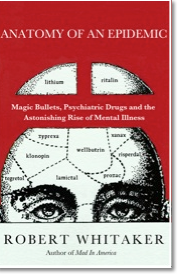Advertisement
Must-Read: Globe Series On Children and SSI
No one's evil. Everyone means well. But many low-income children end up on psychiatric drugs at least in part, it seems, because if they're medicated, their families are likelier to be approved for hundreds of dollars a month in disability payments.
That's my takeaway from the first installment of the superlative, nuanced and deeply reported series by Patricia Wen now running in the Globe.
But I'm no expert. I asked for a reaction from Robert Whitaker, award-winning journalist and author most recently of Anatomy of an Epidemic, a new book that investigates the skyrocketing number of adults and children disabled by mental illness.  His response:
His response:
"I think the families--and our society--really need to look at the toll that this can take on the child. The child declared eligible for SSI is now going to be medicated on a constant basis--after all, the child is now seen as seriously mentally ill-- and often the drug treatment may include a powerful antipsychotic. Over the long term, such drug treatment can cause a host of physical, emotional and cognitive problems, and you are also setting the child on a 'career path' of lifelong mental patient. I don't think the families are thinking about that when they turn to SSI for financial help; they don't see what that this will do to their child down the road. And our society should also take a look at the extraordinary long-term financial cost of putting a child onto this path of life-long disability."
Today's installment of the series describes the heavy use of "speech delay" as a reason to put a child on disability payments, and the frequent failure to follow up on whether the disability remains.
This program aired on December 13, 2010. The audio for this program is not available.
